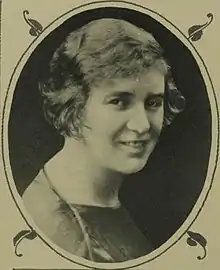Minnie Pallister
Minnie Pallister (12 March 1885 – 26 March 1960) was a writer, teacher, and Labour organiser in Wales, associated with the Independent Labour Party.

Early life and education
Minnie Pallister was born in Kilkhampton, Cornwall, the middle of three daughters of William and Rose (Parsons) Pallister. Her father was a clergyman. She attended Tasker's High School for Girls and earned a teaching credential at Cardiff University.[1]
Career
Minnie Pallister taught for ten years in an elementary school in Brynmawr, where she became familiar with Welsh working lives. Her piano skills were also welcomed by local musicians. By 1914 she was president of the Monmouthshire Federation of the Independent Labour Party (the first woman elected to that position),[2] and serving on the Breconshire Education Committee.[3] Keir Hardie described her "like a new meteor on the horizon" for her eloquence.[1]
In World War I and later she was busy as a speaker for the peace and Labour movements,[4] and organised the No-Conscription Fellowship in Wales.[5] In 1922, as ILP organiser for south Wales, she was quoted on the front page of the Labour Leader declaring: "We were right on the War. We were right on the Peace. We were right on Reparations."[6] She was advertised as "Wales' Greatest Woman Orator" in newspaper announcements.[7] She also ran for office several times in the 1920s, and was quoted about Ramsay MacDonald in the New York Times in 1924.[8]
Pallister stood in Bournemouth at the general elections in 1923 and 1924.
Pallister's health suffered from her constant activity, and she was advised by doctors to change her schedule. She became a full-time writer, though she remained interested in political matters. "My politics are me," she said, "it seems almost impossible that there should still be people who believe that politics do not matter."[9] A lifelong pacifist, she joined the Peace Pledge Union in 1936, was elected to its Council in 1945 and later became a Sponsor. She was a regular contributor to the Woman's Hour BBC radio programme in the 1950s.[10]
Books by Minnie Pallister include Socialism for Women (pamphlet, 1923);[11] The Orange Box: Thoughts of a Socialist Propagandist (1924);[12] Socialism, Equality and Happiness (pamphlet, 1925);[13] Rain on the Corn and Other Sketches (1928);[14] Gardener's Frenzy: Being an Alphabet of the Garden (1933);[15] and A Cabbage for a Year (1934).[16]
Personal life
Minnie Pallister died on 26 March 1960, aged 75.[17]
External links
- Historian Alun Burge wrote a four-part profile of Minnie Pallister on his blog in March 2016.
References
- "Miss Minnie Pallister" Pioneer (11 September 1915): 8.
- "Lady as ILP Leader" Llais Llafur (1 August 1914): 1.
- "Minnie Pallister in Merthyr" Pioneer (15 March 1919): 3.
- "Minnie Missioning: The Gospel to East Denbighshire" Pioneer (4 October 1919): 1.
- "Anti-Conscription Meeting at Ystalyfera" Llais Llafur (8 March 1919): 4.
- Matthew Brown, "WWI: The ILP and the 'Great' War" Independent Labour Publications (3 February 2014).
- Advertisement for Minnie Pallister lecture, Llanelly Star (22 March 1919): 1.
- "Sees British Throne's End; MacDonald's Election Agent Predicts Sloughing Off of Monarchy" New York Times (12 February 1924).
- June Hannam and Karen Hunt, Socialist Women, Britain, 1880-1920s (Routledge 2012). ISBN 9781134766673
- Synopsis, "Woman's Hour" (5 March 1951).
- Minnie Pallister, Socialism for Women (Independent Labour Party Information Committee 1923).
- Minnie Pallister, The Orange Box: Thoughts of a Socialist Propagandist (Leonard Parsons 1924).
- Minnie Pallister, Socialism, Equality and Happiness (Independent Labour Party 1925).
- Minnie Pallister, Rain on the Corn and Other Sketches (Independent Labour Party 1928).
- Minnie Pallister, Gardener's Frenzy: Being an Alphabet of the Garden (Methuen & Co 1933).
- Minnie Pallister, A Cabbage for a Year (Blackie & Son 1934).
- Labour Party National Committee Conference, Volumes 59-61 (1960–1961): 53. "Minnie Pallister, who died in March aged 75, was well-known for her propaganda work, first in Wales and then all over the country in the 1920s. She was compelled by illness to withdraw from active politics for some years, but in recent years became a frequent broadcaster on radio."